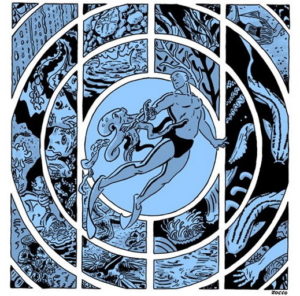
- This event has passed.
Enchanting nature: tentacular storytelling in the Great African Kelp Forest
Roundtable with My Octopus Teacher director Pippa Ehrlich and others from the Sea Change Project
Video recording
About this event
 There is a forest beneath the waves off the western coast of South Africa that is as biologically rich as a tropical rainforest. Few people have experienced the Great African Kelp Forest like the members of the Sea Change Project, a small group of journalists, scientists, photographers and filmmakers who have developed a unique methodology for exploring and learning about, from and with nature called ‘underwater tracking’.
There is a forest beneath the waves off the western coast of South Africa that is as biologically rich as a tropical rainforest. Few people have experienced the Great African Kelp Forest like the members of the Sea Change Project, a small group of journalists, scientists, photographers and filmmakers who have developed a unique methodology for exploring and learning about, from and with nature called ‘underwater tracking’.
The Sea Change Project has spent thousands of hours exploring these wild ‘algal gardens’ and the creatures that live in them, skin- and breath-hold diving in the frigid waters of South Africa’s Cape Peninsula. The group has identified new species and learned to read subtle signs and that give insight into lives, deaths and relationships of the kelp forest’s creatures, a process one member describes as delving deep into ‘the biological mind of the forest’.
The acclaimed Netflix documentary My Octopus Teacher is one example of the project’s approach to ‘multispecies storytelling’ (Haraway, 2016). This is an affective, aesthetic and sensorial approach that focuses on connections, embodied experience and interspecies learning to help people see, experience and value the Great African Kelp Forest in new ways.
In this Q&A Roundtable with the film’s director, Pippa Ehrlich, and Sea Change project members Swati Foster, Carina Frankal and Faine Loubser, we explored questions about Sea Change’s approach to exploring, researching and communicating about the ‘forest beneath the waves’. The conversation was moderated by Amber Huff (STEPS Centre) and Adrian Nel (University of KwaZulu-Natal).
How does the project’s approach diverge from dominant approaches in ecology and marine conservation in terms of underlying assumptions, practices, values and objectives? Can embracing ecological alterity and developing meaningful intimacies with the hidden, ‘alien’ and ‘weird’ aspects of nature nourish new ‘kinships’ and new ways of ‘commoning’ of our relations with others? What are the impacts of such an approach on public awareness and attitudes towards this marine ecology on one level, and on discourses and practice of conservation? Can learning from these approaches help to inform and transform conservation more broadly?
This event is part of the ESRC STEPS Centre’s theme on Natures. It is organized in partnership with the Political Ecology Network (POLLEN), the University of KwaZulu-Natal and the Sea Change Project.
About Our theme for 2020: Natures
 Nature is all around us, but there are many ways of seeing different kinds of ‘natures’, and many efforts to involve it in forms of control or domination.
Nature is all around us, but there are many ways of seeing different kinds of ‘natures’, and many efforts to involve it in forms of control or domination.
How is talk of crisis shaping nature and people’s views of it? How can colonial forms of knowledge, technology and power be challenged, and what might it mean to ‘decolonize’ the study of environmental change? What do alternatives look like, and how can we explore, nurture, imagine and live the relationships we might want for the future?
Find out more about our theme for 2020 on our Natures theme page.